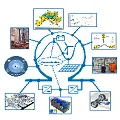TUM Department Electrical and Computer Engineering:
CoC Embedded and Cyber-physical Systems
Center of Competence Embedded and Cyber-physical Systems
MISSION AND GOALS
This CoC supports TUM researchers in multidisciplinary research, new teaching initiatives, large research projects, and advance the state-of-the-art for embedded and cyber-physical systems (CPS).
This CoC also addresses key societal challenges in healthcare, transportation systems, energy and environment.
It will bridge activities between TUM, industry, other universities and research institutes.
CORE COMPETENCIES
CoC is able to mix-and-match the individual competences of the CoC members in leading edge scientific research and their multi-year experience in industry cooperation.
This combination is addressing the technological challenges and problems arising in the space of embedded and cyber-physical systems, but also identifying new directions for interdisciplinary scientific research. Broadly, the competence areas include:
- Application-specific multi-core processor and reconfigurable computing architectures
- Model-based design and synthesis of hardware and software platform
- Co-design of control, computation and communication under resource constraints
- Methods for ensuring real-time performance, security, reliability and energy-efficiency
- CMOS and nanotechnology-based sensors and devices, autonomous sensor networks and sensor-based systems
CoC has competences inautomotive systems and software, medical devices including sensor networks for health monitoring, real-time and embedded multimedia systems, home and building automation systems, and high-performance embedded control systems.
MEMBERS
Coordinator: Andreas Herkersdorf, Integrated Systems
Second Coordinator: Samarjit Chakraborty, Real-time Computer Systems
Gordon Cheng, Cognitive Systems
Jörg Conradt, Neuroscientific System Theory
Robert Diemer, Real-time Computer Systems
Klaus Diepold, Data Processing
Alessio Gagliardi, Simulation of Nanosystems for Energy Conversion
Dip Goswami, Real-time Computer Systems
Hans-Georg Herzog, Energy Conversion Technology
Sandra Hirche, Information-oriented Control
Andreas Jossen, Electrical Energy Storage Technology
Franz Kreupl, Hybrid Electronic Systems
Paolo Lugli, Nanoelectronics
Martin Lukasiewycz, Real-time Computer Systems
Alejandro Masrur, Real-time Computer Systems
Daniel Müller Gritschneder, Electronic Design Automation
Ulf Schlichtmann, Electronic Design Automation
Georg Sigl, Security in Information Technology
Walter Stechele, Integrated Systems
Thomas Wild, Integrated Systems
Majid Zamani, Hybrid Control Systems
RESEARCH
- Automotive Embedded Systems
- Embedded Control Systems
- Advanced automotive driver assistance systems
- Model-based design of embedded hardware & software systems
- Designing Multicore systems and software
- Reconfigurable Computing
- Embedded Network Processing and Communication
- Security in Embedded Systems
- Technologies for energy storage systems
- Electro-mobility and electric vehicles
- Sensor technology using CNTs and other nanomaterials
PROJECTS
- DFG Priority Program 1500 on Dependable Embedded Systems
- DFG SFB-TRR 89: Invasive Computing
- DFG Priority Program SPP1305 on "Control Theory in Digitally Networked Systems"
- BMBF CPS lead project ARAMiS: Multicore for Smart Mobility
- AUTOSAFE: Architecture-aware Timing Analysis and Optimization of Safety-Critical Automotive Software (BMBF)
- Embedded Systems for Electric Vehicles (TUM CREATE)
- Bavarian BICCnet Cluster “AK Multicore”
- CAR@TUM EndorA: Energy management for automotive E/E architectures
www.ei.tum.de/en/research/coc-embedded-systems/
https://www.ei.tum.de/en/research/
